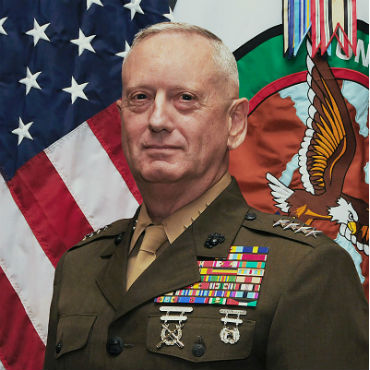Trump selects retired Marine general to head DOD
President-elect Donald Trump wants Gen. James Mattis (ret.) as his secretary of Defense.

Retired Marine General James Mattis
President-elect Donald Trump plans to nominate to name Gen. James Mattis (ret.) as secretary of Defense. The Washington Post reported the pick on Dec. 1, and Trump confirmed his choice later that evening at a rally in Cincinatti.
Mattis, a retired Marine general who led Middle East military efforts as head of Central Command, would require a special dispensation from Congress to take up the civilian post. U.S. law requires a seven-year layoff between military retirement and service in the top echelons of the Pentagon.
Mattis is known as a critic of President Obama's Middle East policy, and particularly of the nuclear deal with Iran. He's also a critic of the sequestration regime that emerged from the 2011 budget bill.
He told the Senate Armed Services Committee in 2015, after his retirement from the Marines, that, "No foe in the field can wreck such havoc on our security that mindless sequestration is achieving." He said that sequestration is "costing military readiness and long-term capability while sapping troop morale."
Mattis also is a determined enemy of that scourge of military culture – the PowerPoint presentation. In 2010, Mattis told attendees at a military conference, "PowerPoint makes us stupid."
And as CENTCOM commander in 2013, Mattis cautioned about the dark side of social media and networked technologies. "Modern communications and social media have the potential to both empower and endanger people," he said. "While they can enable users to better understand their social circumstances and provide ways to organize to improve them, they can also make people more vulnerable to manipulation by malevolent actors. The increasing role of our adversaries in cyberspace necessitates additional emphasis and urgency on a targeted expansion of our presence, influence, capabilities and the authorities necessary to maintain an advantage in cyberspace."
More broadly, Mattis has suggested a desire to break down the siloes and change the culture of DOD. In 2010, as head of the U.S. Joint Forces Command, Mattis said, "Command and control implies trust – an alien concept today [in the Defense Department]. It shouldn’t be need-to-know, it should be need-to-share."






